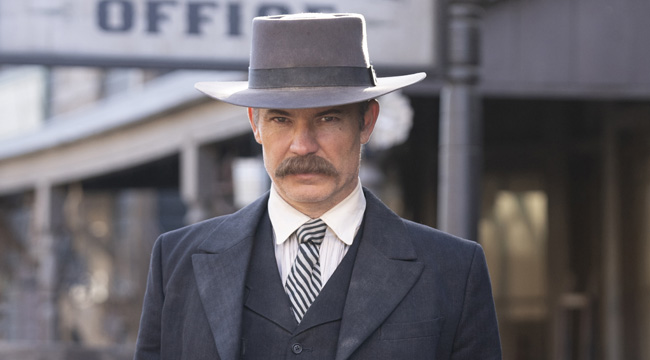
David Milch did it, c*cksuckers. Deadwood: The Movie feels like coming home. I could end the pontificating there, but as with Ian McShane’s Al Swearengen, there are more words to offer, albeit in a much less gracefully profane manner. Tons of starts and stops led up to this event, arriving at a point, honestly, where many fans developed TV show blue balls after a decade or so of teasing.
The collective affection for Deadwood remains difficult to summarize in a few paragraphs, but the success of this follow-up is best summed up with a frustrated Swearengen line early on in the movie: “Does brevity exist in your repertoire, sir?” Miraculously, it does exist here, for within a runtime of 110 minutes, Milch (as creator and writer) managed to wrap a multitude of arcs in a satisfying manner. That’s a testament to his storytelling abilities, in spite of his Alzheimer’s diagnosis, and the talents of the creative team around him. Few people thought this movie would happen, let alone so well, but goddamn it if it does. Clearly, the cast relished revisiting the characters they played for three seasons, a run that launched many careers into the mainstream. Their enthusiasm shines through onscreen in a way that might bring tears to fans’ jaded eyes.
Let’s get down to the bones of this project and travel to that place on the wild frontier where character and dialogue were more important than any happening that actually took place. To that end, this film’s story is a simple one — present and past residents of Deadwood come together to mark the inevitable march toward statehood — that’s portrayed in a believably human way, and an exquisitely rendered one. The vast ensemble cast of familiar faces is once again uttering those lines that linger like smoke twisting in the Gem Saloon, and it feels like such a pleasure to witness almost Shakespearean dialogue amid that familiar backdrop. All of it is riveting, which shouldn’t be surprising, given that Milch once made an episode about kidney stones great.
The gang is back together, mostly, with the most notable omission being Powers Boothe (as saloon owner Cy Tolliver), after a decade-long gap. Timothy Olyphant’s lawman, Seth Bullock, appears to have experienced the ravages of time on the greatest note, but marshaling ain’t easy in a lawless land, one that’s threatened by the further intrusion of Senator George Hearst (Gerald McRaney), who casts a nefarious shadow under the guise of telephone lines and other emblems of progress. He’s reason enough for Bullock and Swearengen to join forces again. Trixie (Paula Malcomson), Sol Star (John Hawkes), Doc Cochran (Brad Dourif), E.B. Farnum (William Sanderson), Wu (Keone Young), and Joanie (Kim Dickens) are all still around, while Calamity Jane (Robin Weigert) and Alma Garret (Molly Parker) return from their own respective journeys. Oh, and Charlie Utter (Dayton Callie) is still extending his genuine hand of welcome, so bless him for being as reliable as ever.
The sheer number of reunions, arguably, takes slightly too long for those who prefer swifter-paced action — which does later fuel the narrative — but few moments feel wasted for those who looked forward to feasting senses upon this show again. The approach is an effective one, for Deadwood: The Movie is at once something to be swallowed whole yet savored, much like those slow pauses favored by Swearingen as he knocks back a shot between sentences of his baroquely profane dialogue. Literally or figuratively, that’s something that doesn’t happen often, in any aspect of life. Pausing isn’t a thing. We’re so conditioned to do something during every down moment. Even at a bar in 2019, few people enjoy actual experiences. We’re staring at our phones and attempting to immortalize these experiences, and Swearengen is not only here to remind us how to slow the hell down in life, but he actually rails against, you know, phones. He wants people to enjoy experiences, no matter how banal, and live.
“A telephone in my joint?” Al disgustedly declares. “A saloon is a fucking sanctuary. Every man with a name knows the value of being unreachable.” He states this, of course, while being orally serviced by one of his prostitutes. As is customary for him to do in Deadwood.
Not only is Milch, through Al, lamenting the passage of time in his own way and championing real experiences, but he does so in a series that remarkably doesn’t feel like time has had an effect on the characters’ cores. Bullock’s still seething with measured rage, Trixie continues to be a spitfire, Sol’s as steady as always, Jane remains an utter delight to watch, the spirit of Wild Bill Hickok lingers, and so on. The story picks up in seamless fashion, no beats are missed, and this movie feels like a true treat in times like these — in a TV landscape that’s vastly different, even on HBO, than when the series launched in 2004. Deadwood never promised dragons or sexy assassins or killer robots or flashiness or CGI, and it’s all the better for playing it simple with complex characters.
Fifteen years later, Deadwood still arrives with no pretense, and the series finally finds itself in a place that feels like a proper finishing point. In the process, scores shall be settled, alliances are tested, and old dynamics flicker up to satisfy audience curiosity. We are lucky to see it all happen, if only for one last shot with Seth Bullock, Al Swearengen, friends, and foes. Drink up, folks.






